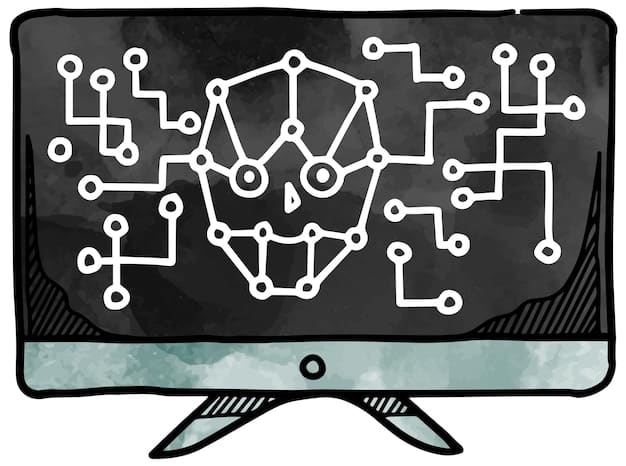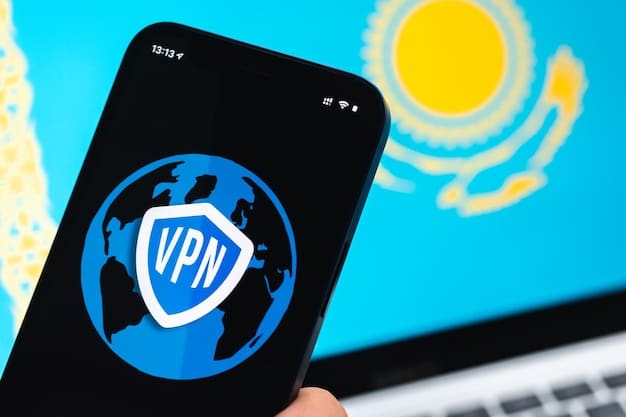DeFi Security Audits: Solana’s Risky Protocols for US Investors

DeFi security audits are crucial for US investors on Solana to identify and avoid risky protocols, assessing smart contract vulnerabilities and potential exploits to safeguard investments.
Decentralized Finance (DeFi) offers exciting opportunities, but it also comes with risks, especially on blockchains like Solana. DeFi security audits: Identifying and avoiding risky protocols on Solana for US investors are essential to protect your investments from potential exploits and vulnerabilities.
Understanding DeFi Security Audits on Solana
DeFi security audits are comprehensive reviews of smart contract code, aiming to identify potential vulnerabilities that malicious actors could exploit. These audits play a critical role in building trust and confidence in DeFi protocols, especially for US investors navigating the Solana ecosystem.
Solana, known for its high speed and low transaction costs, has attracted a significant number of DeFi projects. However, its relative novelty compared to Ethereum means that many Solana-based protocols are still undergoing rigorous testing and auditing. This makes understanding the importance of security audits even more critical.
Why are Security Audits Important?
Security audits provide a critical layer of defense against potential exploits and hacks. Here’s why they are so important:
- Vulnerability Detection: Audits identify bugs, vulnerabilities, and weaknesses in smart contract code that could lead to loss of funds.
- Risk Mitigation: By addressing identified issues, audits help mitigate the risk of exploits and hacks, protecting investors’ capital.
- Building Trust: A successful audit can build trust in a protocol, attracting more users and increasing its overall value.
- Regulatory Compliance: As DeFi matures, regulatory scrutiny is increasing. Security audits can help protocols demonstrate due diligence and compliance.
For US investors, understanding the audit process and seeking out audited protocols is a key step in responsible DeFi investing. Neglecting this step can expose your investments to unnecessary risk.
In conclusion, DeFi security audits are a vital safeguard for US investors in the Solana ecosystem, offering essential protection against vulnerabilities and fostering trust in the burgeoning world of decentralized finance.
Common Vulnerabilities in Solana DeFi Protocols
Solana DeFi protocols, while innovative, are susceptible to a range of vulnerabilities that can lead to significant financial losses. Recognizing these common vulnerabilities is crucial for US investors to make informed decisions.
These vulnerabilities often stem from coding errors, logical flaws, or weaknesses in the design of the smart contracts themselves. Understanding these potential pitfalls can help investors assess the risk associated with different Solana DeFi protocols.

Types of Vulnerabilities
Here are some of the most common types of vulnerabilities found in Solana DeFi protocols:
- Reentrancy Attacks: This allows an attacker to repeatedly call a contract before the initial transaction is completed, potentially draining funds.
- Integer Overflows and Underflows: These occur when arithmetic operations result in values exceeding or falling below the allowed range, leading to unexpected behavior.
- Timestamp Dependencies: Relying on timestamps for critical logic can be manipulated by miners or validators, leading to unfair outcomes.
- Logic Errors: Flaws in the design or implementation of the contract logic can lead to unintended consequences, such as incorrect calculations or unauthorized access.
US investors should be aware that these vulnerabilities are not unique to Solana, but they can be particularly dangerous in a high-speed environment where exploits can be executed rapidly.
In addition, other vulnerabilities such as rug pulls, flash loan attacks, and oracle manipulation can also be possible. Thus, doing a deep research before investing in the area is critical.
In conclusion, recognizing common vulnerabilities in Solana DeFi protocols is an essential step for US investors to assess and mitigate risk, ensuring a more secure and informed approach to decentralized finance.
Identifying Audited Protocols on Solana
Identifying whether a Solana DeFi protocol has undergone a security audit is a critical step for US investors seeking to minimize risk. Audited protocols provide a greater degree of confidence, though it’s important to understand the scope and limitations of any audit.
Several resources and indicators can help investors determine whether a protocol has been audited and access the audit reports themselves. These resources provide valuable insights into the security posture of the protocol.
Resources for Finding Audited Protocols
Here’s how to identify audited protocols on Solana:
- Project Websites: Most audited projects prominently display information about their audits on their websites, often including links to the full audit reports.
- Audit Firm Websites: Reputable audit firms often publish lists of projects they have audited on their websites.
- DeFi Security Dashboards: Some platforms aggregate security information about DeFi protocols, including audit reports and vulnerability disclosures.
- Community Discussions: Check community forums, social media, and other channels for discussions about audits and security assessments.
For each of these audit platforms, do a scan and research to see how a particular protocol works to see if it’s trustable.
In conclusion, identifying audited protocols on Solana is a fundamental practice for US investors seeking to navigate the DeFi landscape with greater confidence and security.

Evaluating the Quality of DeFi Security Audits
Even if a Solana DeFi protocol has been audited, it’s crucial for US investors to evaluate the quality and comprehensiveness of the audit. Not all audits are created equal, and understanding the scope and methodology of an audit is essential.
Factors such as the reputation of the audit firm, the scope of the audit, and the findings and recommendations outlined in the audit report can all provide valuable insights into the security of a protocol.
Key Factors to Consider
Here are some key factors to consider when evaluating the quality of a DeFi security audit:
- Reputation of the Audit Firm: Look for audit firms with a proven track record and expertise in blockchain security.
- Scope of the Audit: Determine whether the audit covered all relevant smart contracts and components of the protocol.
- Audit Methodology: Understand the methods and tools used by the audit firm to identify vulnerabilities.
- Findings and Recommendations: Review the audit report carefully, paying attention to the severity and number of vulnerabilities identified and the recommendations for remediation.
Make sure you are using a reliable audit company which can be vouched for.
In conclusion, evaluating the quality of DeFi security audits is an indispensable skill for US investors seeking to make informed decisions about Solana-based protocols, ensuring a more secure and responsible approach to decentralized finance.
Steps to Take After a Security Audit
After a security audit is completed on a Solana DeFi protocol, it’s crucial for US investors to understand the next steps and how the findings impact the protocol’s overall safety and reliability.
The actions taken by the development team following an audit, along with the transparency in addressing identified issues, are critical indicators of the protocol’s commitment to security. It is important to verify the audit and confirm that the team fixed all the issues.
Follow-Up Actions to Consider
These follow-up actions should be taken after the audit:
- Review the Audit Report: Fully analyze the audit, pinpointing the critical insights discovered.
- Validation of Fixes: Verify that the audit team has re-audited the code and confirmed all vulnerabilities have been resolved.
- Follow the Development Discussions: Stay informed about the team’s communications, particularly those concerning security improvements, in forums and social media.
Doing these, you can confirm that the code is clean, and all exploitable areas have been dealt with in a manner that keeps your money safe and secured at all times.
In conclusion, following up after a security audit is vital for US investors who want to stay informed about the security of Solana DeFi projects and make sure their investments are safe.
Best Practices for US Investors: Avoiding Risky Solana Protocols
For US investors looking to participate in the Solana DeFi ecosystem, adopting a set of best practices is essential for avoiding risky protocols and protecting their investments. These practices emphasize due diligence, risk management, and a cautious approach to new and unproven protocols.
By implementing these strategies, investors can navigate the complexities of DeFi with greater confidence and minimize the potential for financial losses due to exploits or vulnerabilities.
Essential Protection Strategies
Here are some essential protection strategies:
- Diversify Your Investments: Do not put all your eggs in one basket, especially in emerging and new protocols. Use a variety of protocols so not all your money is at stake in case something happens.
- Stay Informed: Subscribe to newsletters, keep up with the project on Twitter, and see if they are active on Telegram or Discord for quick questions.
- Understand Smart Contracts: This will help you know how audits work and how to check if the audits have been done after the protocol’s establishment.
Also, consider insurance options to ensure that a certain amount of your assets and holdings are safe and can be refunded in cases like rug pulls and exploits.
In conclusion, by implementing these best practices, US investors can navigate the Solana DeFi ecosystem with greater confidence and minimize the potential for financial losses, ensuring a more secure and responsible approach to decentralized finance.
| Key Aspect | Brief Description |
|---|---|
| 🛡️ Audit Importance | Essential for identifying vulnerabilities and building trust. |
| 🔍 Vulnerability Types | Including reentrancy attacks and integer overflows. |
| 🔎 Finding Audits | Check project and audit firm websites. |
| ✅ Best Practices | Diversify, stay informed, and understand smart contracts. |
Frequently Asked Questions
▼
A DeFi security audit is a thorough review of a decentralized finance protocol’s smart contract code, aiming to identify vulnerabilities and potential security flaws.
▼
Security audits on Solana are important because they help identify vulnerabilities that could lead to exploits, protecting investors’ funds in the fast-paced Solana ecosystem.
▼
You can check if a Solana protocol has been audited by visiting the project’s website, looking for audit badges, or consulting the auditor’s website.
▼
After a security audit is completed, review the audit report, verify fixes, and stay informed about the protocol’s security updates and improvements.
▼
Some reliable security audit companies include Quantstamp, CertiK, Trail of Bits, and OpenZeppelin. They have different areas of expertise and different costs.
Conclusion
In conclusion, navigating DeFi on Solana as a US investor requires a vigilant approach to security. Understanding and prioritizing DeFi security audits empowers you to make informed investment decisions, safeguarding your assets and fostering trust in the decentralized finance space.





